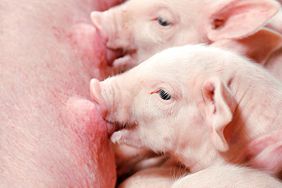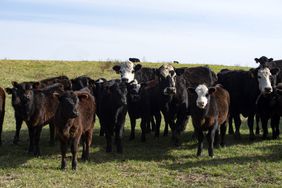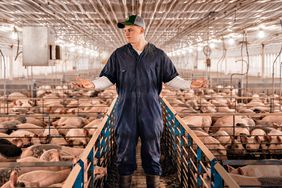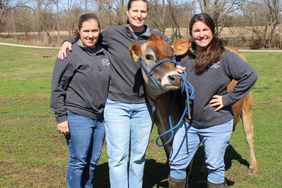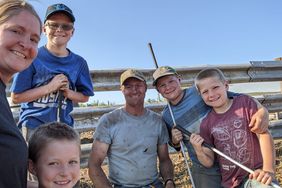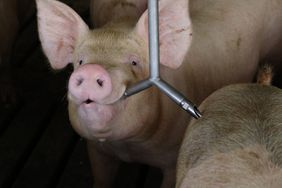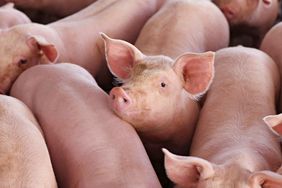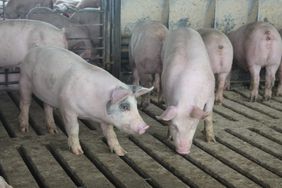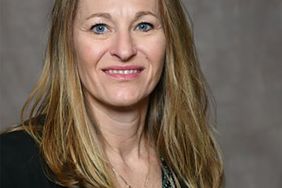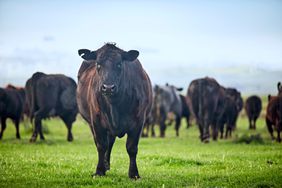:max_bytes(150000):strip_icc()/David20Borrowman20photo-2000-879cea8de4674649a73c439bbdeb0c28.jpg)
The love of pigs runs deep in David Borrowman, and when he saw a chance for hands-on pork production in 2015, he took it.
SF: What is the history of your farm?
DB: I grew up on a hog farm in Illinois, and my parents still farm there, but there wasn't room for me to stay. At that time, I didn't have a big desire to anyway. So I was a wildlife biologist for the USDA. My wife got an opportunity to move to Prague in the Czech Republic, so I resigned my position and we lived in Prague for three years. When we returned, we bought some land close to where her dad farms near Kansas City. I didn't want to go back to working for the government. We decided to start farming, and I knew pigs. We had outdoor hogs growing up. I did a Craigslist search and found people selling grass-fed beef, but I couldn't find anybody doing pastured pork.
We started with 15 Berkshire hogs, selling direct to customers. A neighbor farrows the pigs and we grow them. We named our farm Pastvina Acres Farm. Pastvina means pasture in the Czech language.
We use a USDA-inspected processing plant near the farm. With COVID this year, there was such a demand for meat that I sold 50 of our hogs direct to consumers locally as halves and wholes for people to fill their freezers.
In 2018, we signed up with Niman Ranch and now sell 250 hogs a year wean-to-finish, in addition to our local direct sales. The semi comes to the farm and we'll load on 20 to 60 at a time.
SF: If someone was thinking about joining up with Niman, what advice would you give based on your experience?
DB: Do it. If you're looking for a way to keep your kids on the farm, do it. If you're looking to diversify, do it. You pretty much know what you're going to get for that hog the day it comes to your farm. The price stability is amazing.
Growing up, all of our income came from the farm. At one point, you're selling fat hogs for 50¢ a pound, and then you're selling them for 15¢, and times get lean. I honestly don't know how they did it.
In the past two years, the prices for my hogs fluctuated from 95¢ to $1 a pound. That is a premium over the commodity market, and it is stable.
SF: Did COVID affect your production?
DB: Niman Ranch kept supply chains stable throughout the COVID crisis. We had one group of 17 hogs delayed one week. Niman did not have to euthanize any pigs. They are going to buy your pigs.
SF: What do you use for facilities?
DB: We have one small hoop barn and pasture. If our pigs arrive in cold weather, we use our small hoop as a nursery. In March, we turn them out on corn stubble or winter wheat or rye while we wait for the pastures to green up. We try to keep them on something green, not a dirt lot.
Much of our farm is shaded by walnut and oak trees. It's good hog habitat. When we take them out of the hoop, they do what hogs like to do, which is rooting and flipping over rocks.
SF: Do you have any conservation land?
DB:Yes. The farm had been tilled and tilled before we bought it. There is a lot of slope, so it is hard to hold that soil. We were accepted into the conservation stewardship program, so we are converting 52 tillable acres into pollinator habitat, 13 acres at a time. We've done three tracts, and we'll do the last one in 2021. That land stays in the program for five years, and then it will be pasture for cattle and hogs.
SF: Do you have any other enterprises?
DB: We are farming 200 acres of corn, soybeans, and wheat. We market 3,000 small square bales of straw to a local hardware store each year. There is a robust horse hay business here, because we're 15 minutes from Kansas City. We're in that urban-rural interface where there are a lot of 20-acre ranchettes with one or two horses. We also raise heirloom corn for a local distillery.
People say, "What do you do on your farm?" I tell them, "Anything to make a dollar."

